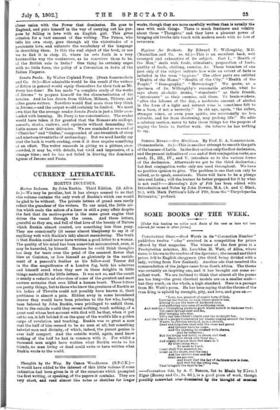C IIRRENT LITERAT IJRE.
HORTUS INCLUSITS.
Hortus Inclusus. By John Ruskin. Third Edition. (G. Allen. 6s.)—We may be peculiar, but it has always seemed to us that this volume contains the only work of Ruskin's which one would be glad to be without. The private letters of grand men rarely reflect the grandeur of the writers. To our mind, the little air- fan which cools the saloon of a liner is still a puny affair despite the fact that its motive-power is the same great engine that drives the vessel through the ocean. And these letters, graceful as they are, and full of that love of the beauty of Nature which Ruskin almost created, are something less than puny. They are occasionally (it seems almost blasphemy to say it of anything writ with Ruskin's ink) almost maundering. The truth is that Ruskin could never have written a good letter to a woman. The quality of his mind has been somewhat misconceived, even, it may be hazarded, by himself. Because he could think thoughts too deep for tears over the petal of the meanest flower that blew at Coniston, or lose himself as gloriously in the ravish- ment of a peacock's feather as his fellow-soul Turner did in the dim magnificence of a London fog, both his admirers and himself erred when they saw in these delights in little things material fit for little letters. It was not so, and the result is nearly a reductio ad absurdum of some of the greatest and most austere ecstasies that ever lifted a human heart. These letters are pretty things, butte those who know the greatness of Ruskin as his ladies of Thwaite could not possibly have known it, their prettiness is almost a pain. Hidden away in some lavendered drawer they would have been priceless to the few who, having been beloved by John Ruskin, were privileged to unfold them. But to the outside world they reveal nothing, teach nothing, of a great soul whose best account with God will be that, when it put out to sea, it left behind it on the quay of the world's life a golden cargo of revelation and teaching. Ruskin was so great a man that the half of him seemed to be no man at all, but something betwixt man and divinity, of which, indeed, the purest genius is ever half compact. And the outside world, again, need know nothing of the half he had in common with it. For whilst a thousand men might have written what Ruskin wrote to his friends, no man living or dead could write or have written what Ruskin wrote to the world.














































 Previous page
Previous page